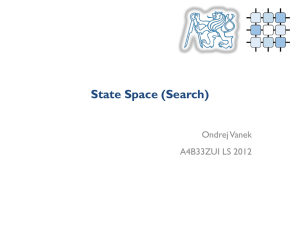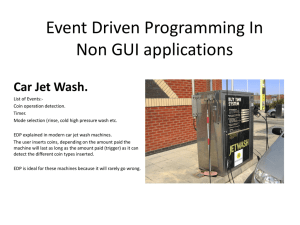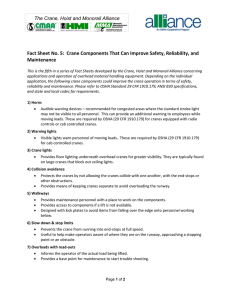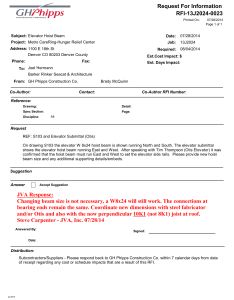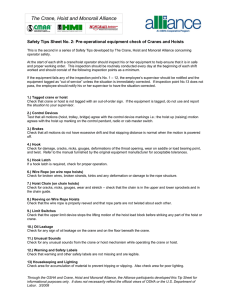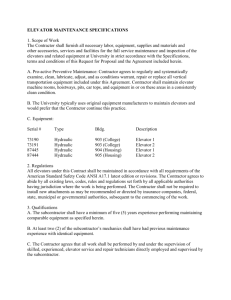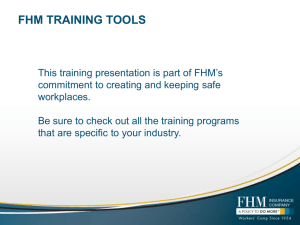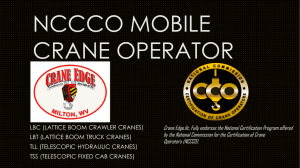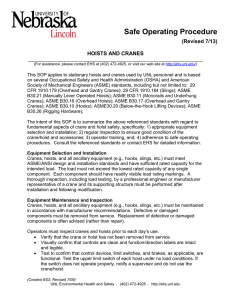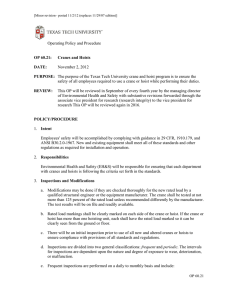Elevators Systems, Hoist & Cranes
advertisement
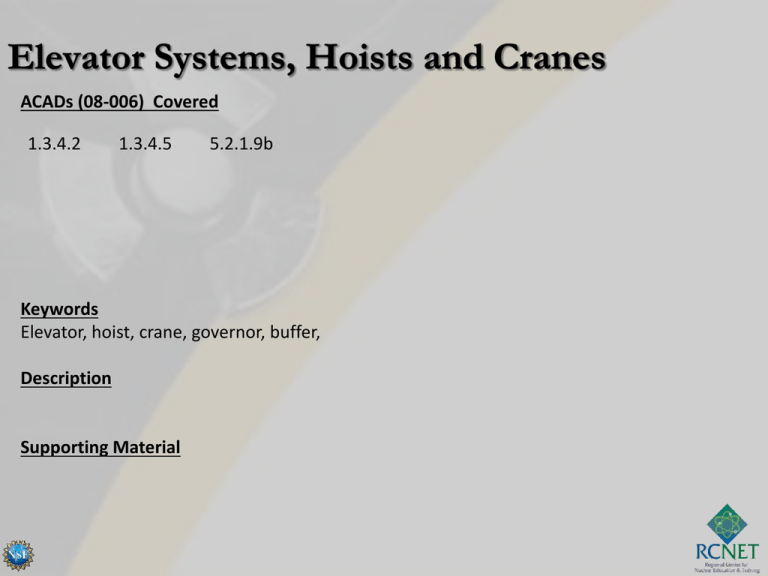
ACADs (08-006) Covered 1.3.4.2 1.3.4.5 5.2.1.9b Keywords Elevator, hoist, crane, governor, buffer, Description Supporting Material Objectives • 1. Explain the different types of elevators and how they are classified. • 2. Review the major components of an elevator system. • 3. List the safety systems incorporated into elevator system design. • 4. Discuss the types of hoist and cranes used on site. Basic Elevator System Basic parts of an elevator 1. 2. 3. 4. Car Rails Hoist-way Machine Room Types of Elevators that are used? Hydraulic Type • Elevator platform is pushed up by hydraulic jack. Limited in height due to length of jack pole (must be buried below unit), used in low raise buildings. Load sits on top of the platform. Traction Type • Uses a system of cables, pulleys and counter weights on a track/rail system. Unlimited height, can be modified for speed and weight requirements. Most common type USED. Classification of Elevators • Passenger elevatorsused for the movement of personnel and limited equipment. Tend to be smaller in size with car doors that limit the entrance to the unit ( open sideways not up and down) • Freight elevator- used for the movement of equipment and heavy loads. The enclosure doors (Gates) open up and down allowing a wider entrance to car. Safety Systems • Governors- monitors the speed of the car and removes power to drive motor and applies brake if moving to fast, If speed continues to build will set the safeties to stop the car. • Safeties- anchors the car to the building by gripping the rails with clamps, activated by the governor. • Buffers- large coil springs or hydraulic – coil shock absorbers which cushion the car at the bottom stop. • Hoist-way Door – interlocked to lock doors to the shaft and allow elevator to move. • Door Reopening Device- prevents doors from opening if >18in from landing. Operates doors in pairs on unit. • Door Closing Sensors- optical sensors or proximity sensors which prevent closing the doors of the car if the opening is blocked. Hoist & Cranes • Crane- a device for lifting and moving heavy weights in suspension. • Hoist- mechanical device used primarily for raising and lowering heavy loads but occasionally for moving objects horizontally. It usually consists of a block and tackle-a combination of one or more fixed pulleys, a moving pulley with a hook or other similar means of attaching loads, and a rope (or cable) between them. Motive power for a hoist may be either manual or supplied by an electric motor. Electrically powered hoists, commonly mounted to the floor or wall, are used for varied lifting and hauling operations in factories and warehouses Types of Cranes • Overhead- most common used at plant ( Bridge Crane). Typical crane system with a movable hoist assembly. • Mobile- crawlers, truck mounted, rail mounted, floating, aerial. • Fixed- tower, telescopic, level, self erecting, Deck (Very large and heavy load lift) Basic Safety Concerns • • • • • • • • • • • • • • • Only Qualified and authorized personnel shall operate equipment A “ load Impact Area” shall be created for all lifts. Unauthorized personnel shall not enter load impact area Don’t ride the hook, sling, ball, or load when moving Lift test will be done prior to using man baskets Load limits shall not be exceeded except for testing Personnel shall not stand or work under loads and lifting gear, or near cable, chains, rope under tension Winch lines, ropes, cables shall not be guided by hand Operators will not leave controls while load is suspended Counter weight area will be marked and barricaded to prevent entry Use extreme caution when operations are within 25 ft of power lines Secure hooks when moving cranes to prevent swinging Use tag lines when moving loads to prevent swinging or twisting Only one person shall give hand signals and be in control with equipment operator, however the stop signal can be given by anyone. Line of sight shall be maintained. Ensure unit is stable and secured on footing prior to load lifts. Typical Hoist System Crane with a hoist system When THINGS go wrong? Review and Questions????
